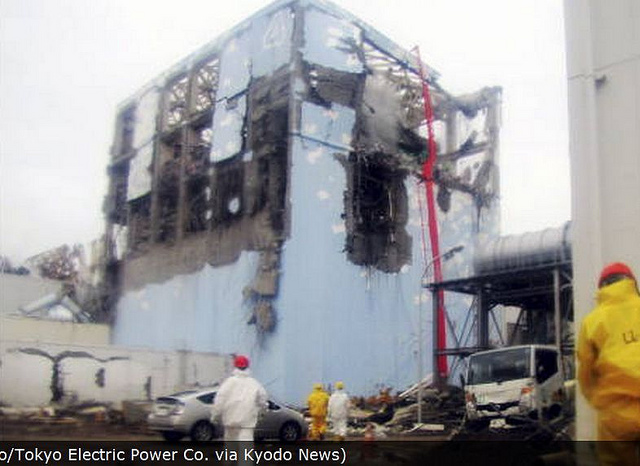
This is now a nuclear reactor (Fukushima #2) looks after an event that "no one could have predicted." (Photo by daveeza/Flickr)
Our national subservience to large companies and rich people — our touching (in the sense of pathetic) faith that might makes right — persists in the face of accumulating, dramatic evidence to the contrary, especially with regard to the two worst industrial accidents of the past year, which are among the worst in history. We are like a wife who catches her husband in flagrante delecto and thinks he has a good point when he denies being unfaithful and says, “Who you gonna believe? Me or your lying eyes?”
Is it fair to call the ongoing meltdown at Fukushima, Japan, an industrial accident? Is it not, in fact, an act of God that, as industry and government spokespeople intone every day, could not have been anticipated? Technically, they are correct when they say that no one predicted a magnitude 9 earthquake. But a 7.5 earthquake, widely expected, could have done the same damage.
Actually, the Fukushima plant did rather well in the earthquake. Its running reactors shut down automatically, and damage was moderate for an event that widely exceeded its design parameters. Then the tsunami came in. Fukushima was built in a 13-foot bluff on the northeast coast; the tsunami that came in that day was 46 feet tall. It did not even notice the tiny offshore breakwater erected to protect against typhoons, on its way to drown the diesel backup generators and plunge Fukushima into meltdown.
No one could have predicted it? (Tsunami is a Japanese word, for crying out loud; they got to name it because they have so many of them.) As the New York Times reports, an advisory group warned Tokyo Electric Power Company about the danger of a tsunami at Fukushima in 2002. The company took another look, and agreed that, yes, a tsunami about 18 feet high — five feet higher than the bluff — was possible. So they raised one electric pump eight inches.
This was an industrial accident in an industry that had been warned it could happen but that chose profit over safety and now says in its defense that no one cold have foreseen the consequences.
There is also new information about the past year’s other mega-disaster, the Gulf of Mexico oil spill. It comes from a new report prepared for the US Interior Department, using data from the post-mortem examination of the blowout preventer — the 50-foot-tall, 50-ton machine that sits on the sea floor and is supposed to pinch off the well pipe if it detects a blowout. The general media have widely disseminated the report’s observation that the blowout preventer failed because a piece of pipe, bent by the blowout, jammed the mechanism.
But so far only Steve Levine of Foreign Policy Magazine and Rachel Maddow of MSNBC (supported by ClimateProgress.org) have followed the report to its conclusion: that it is not merely that the blowout preventer did not work, it cannot work in the enormous pressure found at such depths, on the thickness of the pipe required by that pressure.
But could anyone have foreseen this fact? As Foreign Policy reports, “In 2004, a study commissioned by federal regulators found that only three of 14 newly built rigs had blowout preventers that could squeeze off and cut the pipe at the water pressure likely to be experienced at the equipment’s maximum water depth.”
The US Interior Department that received the above report has in the past month issued five new permits for additional drilling in the deepwater Gulf, assuring anyone who asks that “rigorous new safety standards” are being applied. Yet almost all the deepwater wells are using, and all the new ones plan to use, a blowout preventer that cannot work at those depths.
This was an industrial accident in an industry that had been warned it could happen but that chose profit over safety and now says in its defense that no one cold have foreseen the consequences.
So who you gonna believe? Them or your lying eyes?
The Japanese at least made known to the rest of the world all the problems that arose when their nuclear plants were struck by the recent disaster, so that others could make timely preparations for things like the resultant radioactive fallout, contamination etc. CHINA, by contrast, is notorious for covering up everything as far as possible. It was this attitude that caused SARS to bring about the damage it did: rather than warn everyone quickly, they tried covering it up for weeks or even months until it could no longer be contained. (To make matters worse, you have online Chinese jingoists around who seek to defend the actions of their elites.)
Now in China there are 13 nuclear power plants in operation, more than 25 under construction, and still more down the line. And there have been severe earthquakes in China too. If one fine day a major quake were to strike in the Middle Kingdom and crack up a few of their reactors, you can be sure they’d keep mum until everyone in Asia and further away is stricken with the radioactive fallout.
I LOVE China. I sure do.